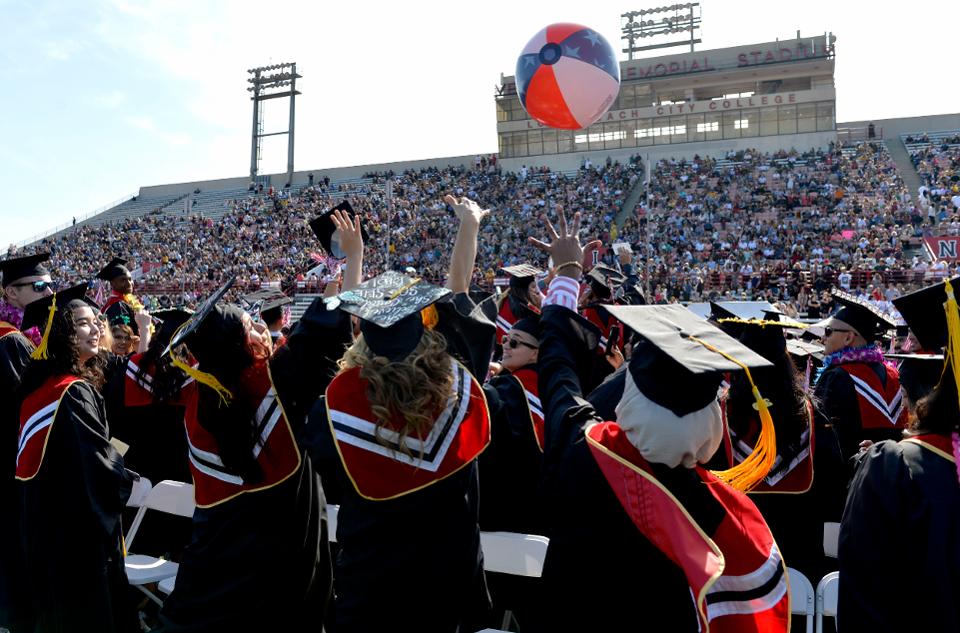Source: wsj.com
If the college-admissions scandal is any guide, attending an elite college is a ticket to a high-paying job. So what about students at lesser-known colleges, with names few people even recognize?
Many find themselves on the wrong side of a recruiting gap, where students at colleges that aren’t on corporate recruiters’ list of target schools must battle hard to get noticed.
Ask Andrew Huang, a 2018 graduate of tiny Gordon College in Wenham, Mass. He chose Gordon for its sense of community, close student-faculty ties and proximity to Boston. But he aspired to work in finance—a competitive field where many firms recruit interns and employees from a cadre of elite target schools.
Dogged networking for an internship during his sophomore year, both at events and via emails and phone calls, netted Mr. Huang more than 100 new contacts—although many of his conversations with them were discouraging. He still remembers one investment banker’s response to his pitch: “He said no, that because I didn’t go to one of the firm’s target schools, it would be too much of an uphill battle for me,’ ” Mr. Huang says. “In that moment, I just knew that I had to keep working hard.”
Mr. Huang eventually reached his goal, landing an internship in finance and a job after graduation as an analyst at Cambridge Associates, a global investment-advisory firm in Boston.
Small colleges do have major strengths, of course. Students often seek them out for a well-rounded liberal-arts education and a more intimate campus experience. They also tend to have cohesive networks of alumni who go to bat for current students seeking internships and jobs.
Still, students from elite colleges and universities such as the Ivy League and Stanford, or big, highly regarded state schools such as Penn State and the University of Michigan, are far more likely to see corporate recruiters on campus. Fewer employers are now sending representatives to colleges in the first place—about 72% compared with 89% in 2006, says Edwin Koc, director of research at the National Association of Colleges and Employers. Students from elite schools, however, are also more frequently the target of online recruitment ads.
Getting on recruiters’ radar as a sophomore or junior is more important amid a trend toward employers assessing potential candidates earlier. Recruiters in competitive fields expect students to start gaining internship experience by their sophomore year. That means hiring decisions that used to be made in students’ senior year are now taking place two years earlier—a fact easily missed by the average 19-year-old.
Paul Pesek was almost blindsided by this ramped-up process. As a sophomore math and economics major at Wheaton College near Chicago, he knew he wanted to work in a high-impact job, but he had little idea how to proceed. He was shocked into awareness by a venture capitalist who spoke on campus about how to land challenging jobs in finance, consulting and technology. The message: “This ship is taking off and you need to get on it now,” Mr. Pesek says.
He began networking with Wheaton alumni, friends and others, in the hope of landing a summer internship in finance. “It took a ton of conversations, and frankly, painful ones at first,” he says. He flew to New York on one fall break with only a single appointment set up, then scheduled a half-dozen more by telling contacts, “I’m coming to New York for a networking week,” he says. His efforts paid off. He landed an internship at Morgan Stanley , and a job after his 2013 graduation at the consulting firm McKinsey & Co. He later moved on to a private-equity firm.
To help other students, Mr. Pesek co-founded a mentoring organization in 2016, Vocational Capital. A friend, Evan Weir, founded a chapter at his alma mater, Covenant College in Lookout Mountain, Ga. Mr. Huang, who was mentored at Gordon College by a friend of Mr. Pesek’s, is helping run a third chapter there. They’ve enrolled 91 students in the program so far, Mr. Pesek says.
Their message to other students: “You’re going to end up working as a barista if you don’t have a plan,” says Mr. Weir, a 2015 grad whose networking helped him land an internship, and later a full-time position, at a Wall Street firm.
Big employers can’t recruit on all of the nation’s 3,000 four-year campuses, of course, but they’re more likely to recruit at lesser-known schools if alumni hold top jobs at the company. Companies say they democratize the hiring process by posting internships and jobs on their websites so that students from any school can apply. Online applications are easily overlooked amid hundreds of competitors or weeded out by applicant-tracking systems, however.
Small colleges are taking steps to make their students more visible. Furman University, a liberal-arts college in Greenville, S.C., flips the recruiting model by taking groups of students to meet college-relations managers at New York financial-services and media companies.
Gordon College creates internships in-house. Neema Kamau, a senior there, says experience she gained as an assistant to the college’s CFO helped her land an internship this summer as a global markets analyst with Bank of America Merrill Lynch in New York.
Another innovative program by a Chicago consulting firm, Parker Dewey, is an online micro-internship platform that links college students and recent grads with employers offering paid, short-term projects. The site gives students from any school a chance to gain experience and show off their skills, and it has attracted many employers seeking more diverse candidates, says CEO Jeffrey Moss. “We offer a broader employee pool, as opposed to the walled gardens that exist now in campus recruiting,” he says.
Alexa Arakelian, a senior in pre-law studies at Beloit College in Wisconsin, says work experience she gained through Parker Dewey enabled her to compete successfully against students from larger schools for a summer internship at a Chicago security-consulting firm. “It puts us on the same playing field,” she says. “That experience helped me get an amazing summer internship I never thought I’d get.”
Getting Hired if You Attended a Little-Known College
* Begin as a freshman to plan internships or other work experience.
* Update and polish your LinkedIn profile to reflect your experience and goals.
* Tap your college career-services center to practice mock interviews and other skills.
* Build your network of professional contacts via email, phone calls and events.
* Consider asking administrators at your college to shadow or intern for them.



